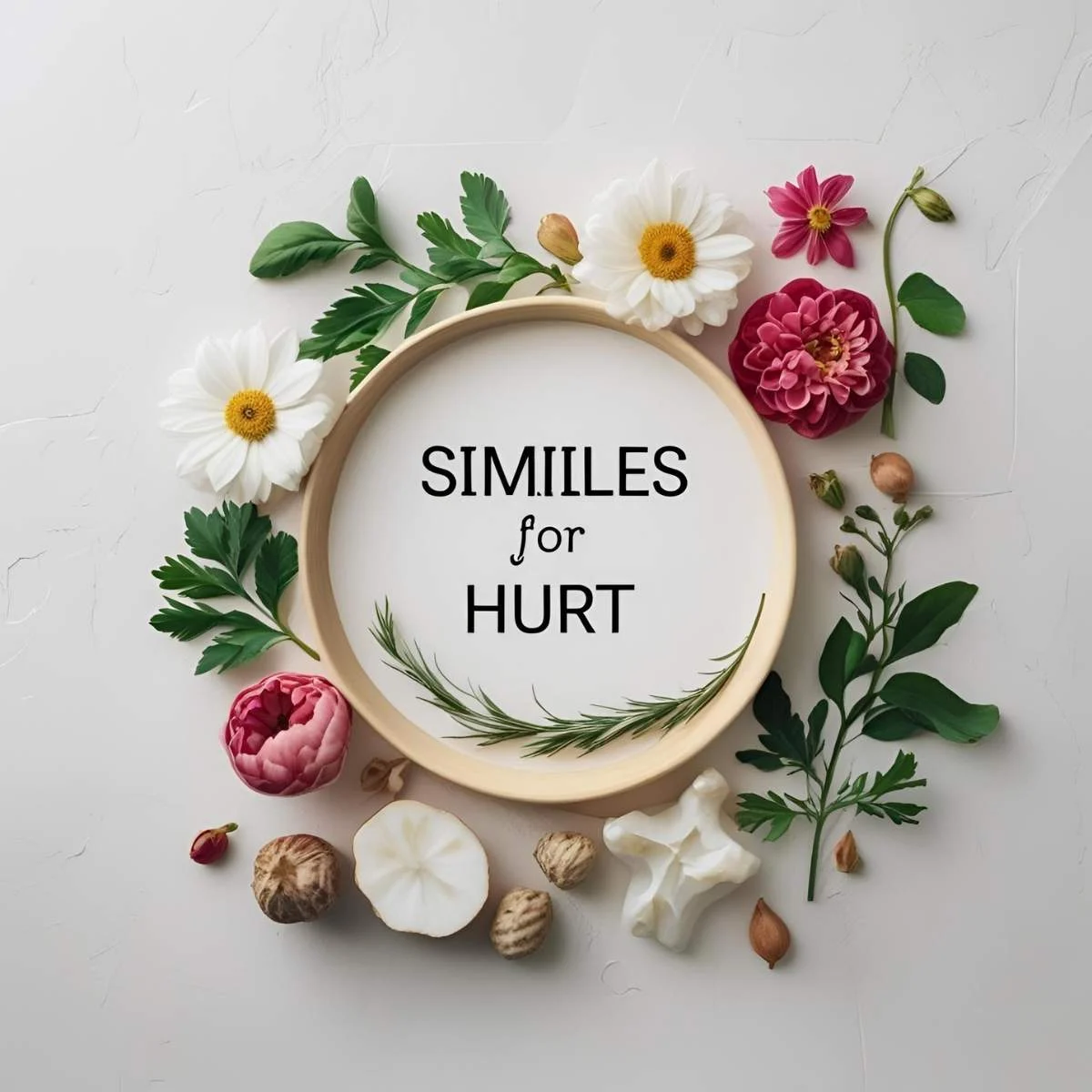The Art of Similes in Expressing Hurt 🖌️
Similes are like lanterns in the dark, illuminating complex emotions by comparing them to familiar things with “like” or “as.” They transform raw feelings into vivid, relatable images, making pain—whether physical, emotional, or social—tangible and poignant. Instead of saying, “I felt heartbroken,” try “My heart ached like a cracked glass, fragile and sharp.” Similes invite readers to connect deeply, whether in poetry, stories, or heartfelt conversations. Hurt is universal, yet deeply personal—how do you describe it? Let’s explore 25 similes for hurt, organized by theme, to bring pain to life with empathy and creativity. 💔
Similes for Hurt: 25 Poignant Comparisons
These 25 similes capture the many shades of hurt—physical pain, emotional wounds, or social stings. Grouped thematically, each includes a meaning, a contextual example, and a specific application for writing, speaking, or reflection. Let’s dive into the language of hurt with compassion.
Physical Hurt: The Body’s Cry 🤕
Similes for the sharp, throbbing, or lingering sensations of physical pain.
- Hurt stabs like a knife, slicing through flesh.
Meaning: Physical pain cuts sharply, like a blade piercing skin.
Example: In a sports story, “Her ankle hurt stabbed like a knife, each step a fresh wound.”
Application: Use in a narrative about injury or a journal entry, e.g., “My sprain stabs like a knife when I walk.” - Hurt burns like embers, smoldering under the skin.
Meaning: Pain lingers intensely, like glowing coals that refuse to fade.
Example: In a medical memoir, “His burn hurt like embers, a constant glow of agony.”
Application: Perfect for describing chronic pain in a blog or a doctor’s note. - Hurt throbs like a drum, pounding relentlessly.
Meaning: Pain pulses rhythmically, like a drumbeat echoing in the body.
Example: In a recovery scene, “Her headache throbbed like a drum, echoing with every heartbeat.”
Application: Use in a health article or a diary about migraines. - Hurt gnaws like a rat, chewing through bone.
Meaning: Pain feels like a persistent, biting force, like a rodent gnawing.
Example: In an adventure tale, “His broken leg gnawed like a rat, relentless in the cold.”
Application: Great for survival stories or describing intense pain in a fitness log. - Hurt crashes like waves, overwhelming in surges.
Meaning: Pain hits in powerful bursts, like ocean waves breaking on shore.
Example: In a hospital scene, “The pain crashed like waves, drowning her in each pulse.”
Application: Use in medical narratives or a social media post about recovery.
Emotional Hurt: The Heart’s Wounds 💔
Similes for the ache of heartbreak, grief, or betrayal.
- Hurt aches like a bruise, tender under every touch.
Meaning: Emotional pain lingers sensitively, like a bruise that hurts when pressed.
Example: In a breakup story, “Her heart ached like a bruise, wincing at his name.”
Application: Use in a love poem or a text to a friend, e.g., “This rejection aches like a bruise.” - Hurt stings like nettles, sharp and lingering.
Meaning: Emotional pain pricks quickly but leaves a lasting burn, like nettles.
Example: In a diary entry, “His words stung like nettles, their venom lingering in my thoughts.”
Application: Perfect for reflective writing or a journal about betrayal. - Hurt weighs like an anchor, dragging the heart down.
Meaning: Grief feels heavy and immobilizing, like an anchor sinking a ship.
Example: In a grief memoir, “Her loss weighed like an anchor, pulling her into silence.”
Application: Use in an elegy or a condolence letter to express sorrow. - Hurt cracks like glass, shattering the soul’s calm.
Meaning: Emotional pain fractures inner peace, like glass breaking apart.
Example: In a novel, “His betrayal cracked her heart like glass, leaving sharp edges.”
Application: Great for character-driven stories or a therapy journal entry. - Hurt festers like a wound, growing worse in silence.
Meaning: Unspoken pain worsens over time, like an untreated wound.
Example: In a poem, “Her hurt festered like a wound, unspoken in the dark.”
Application: Use in introspective poetry or a mental health blog post.
Social Hurt: The Sting of Rejection 😞
Similes for the pain of exclusion, embarrassment, or social slights.
- Hurt bites like frost, chilling the spirit.
Meaning: Social rejection feels cold and sharp, like frostbite on skin.
Example: In a school story, “Being ignored bit like frost, chilling her confidence.”
Application: Use in a teen novel or a post about feeling left out, e.g., “That snub bit like frost today.” - Hurt pricks like thorns, sharp in a crowd.
Meaning: Social slights jab painfully, like thorns in a rosebush.
Example: In a party scene, “Their laughter pricked like thorns, excluding her from the joke.”
Application: Perfect for a short story or a tweet about social awkwardness. - Hurt slaps like a wave, shocking the ego.
Meaning: Public embarrassment hits suddenly, like a wave crashing over you.
Example: In a classroom scene, “His wrong answer slapped like a wave, reddening his face.”
Application: Use in a humorous essay or a group chat about school mishaps. - Hurt pinches like a crab, sudden and sharp.
Meaning: Social pain grabs quickly, like a crab’s claw.
Example: In a social media post, “Her comment pinched like a crab, catching me off guard.”
Application: Great for a vlog about navigating friendships or a diary entry. - Hurt bruises like a peach, tender under scrutiny.
Meaning: Social criticism leaves a lingering mark, like a bruise on soft fruit.
Example: In a workplace scene, “The boss’s critique bruised like a peach, leaving her raw.”
Application: Use in a professional reflection or a post about feedback.
Hurt as a Silent Struggle 🌫️
Similes for internal, often hidden, emotional pain.
- Hurt simmers like a pot, bubbling beneath the surface.
Meaning: Pain lingers quietly but intensely, like a pot about to boil over.
Example: In a therapy session, “Her hurt simmered like a pot, ready to spill in tears.”
Application: Use in a mental health essay or a journal about suppressed feelings. - Hurt creeps like fog, clouding every thought.
Meaning: Emotional pain spreads subtly, like fog obscuring a landscape.
Example: In a reflective poem, “His hurt crept like fog, dimming his once-bright dreams.”
Application: Perfect for introspective writing or a letter about personal struggles. - Hurt gnaws like termites, eroding inner strength.
Meaning: Pain slowly weakens resilience, like termites eating wood.
Example: In a character study, “Her grief gnawed like termites, hollowing her courage.”
Application: Use in a novel or a speech about overcoming adversity. - Hurt lingers like an echo, fading but persistent.
Meaning: Pain reverberates quietly, like an echo in a canyon.
Example: In a breakup story, “His hurt lingered like an echo, haunting her quiet moments.”
Application: Great for a love story or a journal about moving on. - Hurt twists like a knot, tightening with every memory.
Meaning: Emotional pain tightens over time, like a knot growing taut.
Example: In a memoir, “Her regret twisted like a knot, tightening with each old photo.”
Application: Use in a personal essay or a post about nostalgia.
Hurt with Cultural Resonance 🌍
Similes inspired by cultural or historical imagery of pain.
- Hurt pierces like an arrow, striking the heart’s core.
Meaning: Pain hits deeply, like an arrow from an ancient bow.
Example: In a historical novel, “His loss pierced like an arrow, wounding his warrior spirit.”
Application: Use in a cultural story or a speech about enduring hardship. - Hurt weeps like a willow, drooping with sorrow.
Meaning: Pain expresses itself quietly, like a willow’s branches in the wind.
Example: In a cultural poem, “Her hurt wept like a willow, swaying in ancestral grief.”
Application: Perfect for poetry or a blog about cultural mourning. - Hurt carves like a chisel, shaping the soul’s story.
Meaning: Pain shapes character, like a chisel sculpts stone.
Example: In a heritage tale, “His struggles carved like a chisel, etching resilience into his life.”
Application: Use in a family history or a speech about growth through pain. - Hurt dances like a storm, chaotic yet fleeting.
Meaning: Pain moves unpredictably, like a storm’s wild dance.
Example: In a cultural festival scene, “Her hurt danced like a storm, swirling through the music.”
Application: Great for a story about emotional release or a post about festivals. - Hurt is a shadow, trailing like a silent ghost.
Meaning: Pain follows quietly, like a shadow or ancestral spirit.
Example: In a reflective essay, “His hurt was a shadow, trailing like a ghost through his days.”
Application: Use in a memoir or a speech about carrying cultural pain.
Creative Examples to Deepen Empathy 🥀
These similes paint hurt in vivid hues. “Hurt stabs like a knife” captures the raw shock of a sprained ankle in a soccer game, perfect for a sports blog. “Hurt weeps like a willow” evokes the quiet sorrow of loss, ideal for a poem about family. Ever felt hurt “creep like fog” during a tough day? Try it in a journal entry. Which simile resonates with you—does your hurt burn like embers or linger like an echo?
Try This: Pick a simile and write a sentence about a recent moment of hurt, like “My rejection stung like nettles today.” Share it in a journal or with a trusted friend.
Practical Applications for Every Voice ✍️
These similes can enrich your expression of hurt:
- Poetry: Use “hurt weeps like a willow” to craft emotional lines, e.g., in a poem about loss.
- Stories: Add “hurt stabs like a knife” to a novel’s injury scene or “hurt cracks like glass” for a breakup.
- Speeches: Say “Our hurts carve like chisels, shaping us” in a motivational talk about resilience.
- Conversations: Share “This argument pricks like thorns” in a text to express a social slight.
- Social Media: Post “My heart weighs like an anchor tonight 💔” to connect with followers.
Challenge: Rewrite a plain sentence about pain, like “I was sad,” to “My hurt crept like fog.” Notice how it deepens the emotion!
Conclusion: Let Similes Heal Your Words 🌱
Similes are a balm, turning the rawness of hurt into art that connects us. From “knives” of physical pain to “willows” of cultural sorrow, these comparisons make pain speak. Try weaving one into your next poem, post, or chat—maybe “My hurt burns like embers” for a tough day. Better yet, craft your own simile: is your hurt a “thorn” or a “storm”? Share it with a friend or tweet it to spark empathy. Pain is part of life, but similes make it a story—tell yours with heart. 🌟



